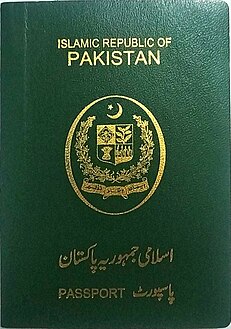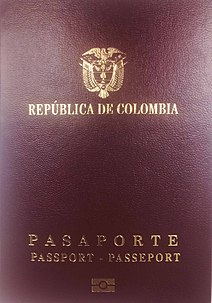
Visitors to Taiwan must obtain a visa or authorization in advance, unless they come from one of the visa exempt countries or countries whose nationals are eligible for visa on arrival. All visitors must hold a passport valid for 6 months.

Visitors to the mainland of the People's Republic of China must obtain a visa from one of the Chinese diplomatic missions, unless they come from one of the visa exempt countries. The two Special Administrative Regions – Hong Kong and Macau – maintain their own independent border control policies and thus have their own separate visa requirements.

Mexican visas are documents issued by the National Migration Institute, dependent on the Secretariat of the Interior, with the stated goal of regulating and facilitating migratory flows.

Visitors to Indonesia must obtain a visa from one of the Indonesian diplomatic missions unless they come from one of the visa exempt countries. All visitors must hold a passport valid for 6 months as well as a valid return ticket. Passport with validity of more than 3 months can be accepted in special cases or business travel. The immigration officer at the port of entry may ask the passenger to produce any necessary documents.

Visa requirements for Pakistani citizens are administrative entry restrictions imposed on citizens of Pakistan by the authorities of other states. As of 02 July 2019, Pakistani citizens had visa-free or visa on arrival access to 30 countries and territories, ranking the Pakistani passport 106th in terms of travel freedom according to the Henley Passport Index.

Visa requirements for Indian citizens are administrative entry restrictions by the authorities of other states placed on citizens of India. As of 1 October 2019, Indian citizens had visa-free or visa on arrival access to 59 countries and territories, and ranking the Indian passport 82nd in terms of travel freedom according to the Henley Passport Index.
Visa requirements for Bangladeshi citizens are administrative entry restrictions imposed on citizens of Bangladesh by the authorities of other countries. As of 2 July 2019, Bangladeshi citizens who hold regular or ordinary Bangladeshi passports have visa free or visa on arrival access to 39 countries and territories, ranking the Bangladeshi passport 101st in terms of travel freedom according to the Henley Passport Index. Bangladeshi citizens who hold Diplomatic passports and/or Official passports of Bangladesh have visa free or visa on arrival access to many more countries.

Visa requirements for Indonesian citizens are administrative entry restrictions imposed on citizens of Indonesia by the authorities of other states. As of 28 September 2019, Indonesian citizens had visa-free or visa on arrival access to 70 countries and territories, ranking the Indonesian passport 73rd in terms of travel freedom according to the Henley Passport Index. Indonesia is also a part of ASEAN and has visa-free access to these countries and vice versa.

Visa requirements for Colombian citizens are administrative entry restrictions by the authorities of other states placed on citizens of Colombia.

The Government of Brunei Darussalam allows citizens of specific countries/territories to travel to Brunei for tourism or business for up to 90, 30 or 14 days without having to obtain a visa.

The visa policy of South Africa is how the South African government determines who may and may not enter their country. Visitors to South Africa must obtain a visa from one of the South African diplomatic missions unless they come from one of the visa exempt countries, in which case they get what is called a "Port of Entry Visa". Visitors who require a visa must apply in person and provide biometric data.

South Korea maintains a visa waiver agreement list and a designated visa-free entry list with countries not included on those lists requiring a visa to enter the country. In addition, foreigners wishing to engage in certain activities such as diplomatic work, gainful employment, study or residence must apply for the appropriate visa prior to engaging in that activity in country.

The visa policy of the United Kingdom is the policy by which Her Majesty's Government determines who may and may not enter the country of the United Kingdom, and the Crown dependencies of Guernsey, Jersey, and the Isle of Man. Visitors must obtain a visa unless they are exempt.

Visitors to Thailand must obtain a visa from one of the Thai diplomatic missions unless they come from a visa-exempt country or a country whose citizens are eligible to obtain visas on arrival.

Visitors to Iran must obtain a visa from one of the Iranian diplomatic missions unless they come from one of the visa exempt countries or countries eligible for a visa on arrival. All visitors must hold a passport valid for at least 6 months. Admission is refused to women not wearing Islamic head cover, scarf, long sleeves and stockings. Citizens of Israel are totally banned from entry to Iran.

In accordance with the law, citizens of all countries require a visa to visit Turkmenistan, unless they have special passsports or are from certain parts of Kazakhstan or Uzbekistan. To obtain a tourist visa for Turkmenistan, all foreign nationals must supply an invitation letter issued by a travel agency licensed in Turkmenistan.
An A Visa is a category of non-immigrant visas allowing travel to the United States issued to ambassadors, diplomats, government officials, and their support staff.
Visa requirements for crew members are administrative entry restrictions imposed by countries on members of the crew during transit or turnaround.
The C-2 visa is a non-immigrant visa which allows individuals to travel to United States for the purpose of immediate and continuous transit to or from the headquarters of the United Nations, or for United Nations officials transiting the US to another foreign nation. The holders of such a visa are considered "geographically restricted nonimmigrants".
The C-3 visa is a non-immigrant visa which allows governmental officials and their families, attendants, servants and employees to travel to United States for the purpose of transiting through the country. The maximum duration of stay is 29 days.
















